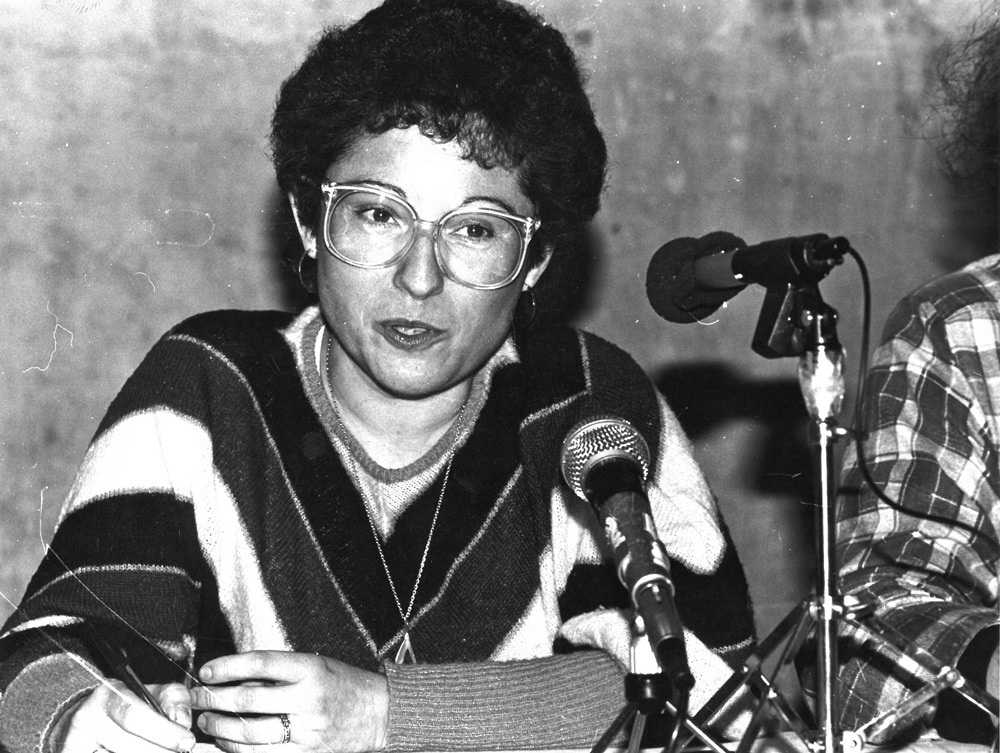Beyond the space and time of the heteropatriarchy
- What if a group of theoretical politicians took power by military blows and women became state property? On the basis of this question, Margaret Atwood wrote her novel The Handmaid’s Tale in 1985, which not long ago has adapted to the format of the series, achieving great popularity. One of the most notable signs is that the claims that feminist science fiction is healthy are correct.

In the dystopia created by Atwood, patriarchy takes the form of a fundamentalist dictatorship, leaving women without rights and limiting their work to reproduction. Being a society in which air pollution has sterilized the majority, reproductive women have become slaves to the service of upper-class families who cannot have biological descendants, and are continuously raping them. The success of the series is probably no coincidence that it took place at a time when the debate on rental seats is in the red.
The writers Jen Green and Sarah Lefanu explained it in their book Despatches from the Frontiers of the Female Mind: “Science fiction allows us to investigate the current situation of women, to better focus and illuminate the situation with their own gender metaphors; that is, we can write about the future, but we are actually writing about the present.” So, if Atwood's work has been successful, it makes sense to think it has been because of its ability to analyze the situation of women in contemporary society.
As it usually starts from the question “What would happen…?”, science fiction opens the door to reflection and imagination. This door, besides analyzing the present, offers the possibility of speculating about the future. In the specific case of feminist science fiction, gender allows a space to reflect and overcome the discrimination and oppression women experience. In the words of feminist science fiction writer Pamela Sargent, “only women can show fantastic science fiction and literature in totally new or strange environments. Once the cutbacks that affect our lives have disappeared, they can predict what we can become, or show new problems and limits that may emerge.” In the same vein, Green and Lefanu made the following statement: “Science fiction allows us to look beyond the restrictive roles imposed on women, expanding the possibility of describing our dreams and nightmares.” Apparently, science fiction is a fertile land for feminism.
.jpg)
From the outset, the field of women
However, the relationship between gender and women is not new. What's more, a woman is the creator of science fiction. The genre was born by Mary Shelley in 1818 with her novel Frankenstein. Shelley, as usual in science fiction, presents us with a non-existent being that can be born through science, focusing on the social consequences that its creation can entail.
Among the women who have contributed to gender, Shelley is Charlotte Perkins Gilman and Thea Von Harbou. Perkins wrote Herland in 1915, a utopia that speaks of an exclusively female society. Von Harbou published Metropolis in 1925, which her husband brought to the movies and which is considered one of the best films of the Film Mutual. Even today all the merit is recognized to Fritz Lang, her husband, although the original idea and script are by Von Harbou.
A woman is the creator of science fiction. Mary Shelley gave birth to the genre in 1818 with her novel Frankenstein
After the second decade of the 20th century, there is a gap in terms of women who have contributed to science fiction. By reversing the initial situation, gender became a male monopoly until the 1970s. However, the second wave of feminism revolutionized the situation, and female writers who suddenly appeared changed radically the codes and topical genres of science fiction until then. Feminist science fiction was about to be born.
“In science fiction, sexual roles are as unalterable as the metal of the hull of the spacecraft, and emancipation, the unknown word,” Sam Lundwall said in 1971, even without realizing that the situation was going to change. Lundwall had every reason to be pessimistic, because in the genre that until then allows us to represent fascinating and totally different promises, everything is transformed except gender. However, the writers of the 1970s revolutionized the landscape and shifted to the center both gender relations and gender roles in stories that occurred in complex imaginary societies. A good blow to a genre accustomed to the adventures of space and female characters with passive roles.
Ursula K. Le Guin has been considered the great referent of this time, as he unexpectedly entered a male area and revolutionized order. Some of the most important works of the genre are attributed to it, although the most mentioned is The Left Hand of Darkness (1969). In this work we talk about gender and sexuality, from the point of view of the earthly who has just reached a planet formed by people who have become hermaphrodites and with the ability to change sex. Behind Le Guin came a whole generation of writers who gave rise to new themes and points of view. Lisa Tuttle, Vonda McIntyre, Marion Zimmer Bradley, Octavia Butler or James Tiptree Jr. are some of the names of this generation. Some of them were explicitly presented as feminists, like Joana Russ. Russ presents in his writings protagonists with problems of contradiction, doubt and identity, with the aim of promoting a feminist reflection on the social role of women. Once the purple flag was stuck in science fiction plans – a small step for women, a big step for humanity – feminist science fiction stabilized as its own gender.
Jen Green and Sarah Lefanu: “Science fiction allows us to look beyond the restrictive roles imposed on women, extending the possibility of describing our dreams and nightmares”
Since then, the amount of work they have contributed to gender has not ceased. The trajectory of years has also given rise to evolution, as can be seen in the themes and points of view in which one works. The stories have become increasingly complex and the characters of each of them present diverse identities. So diverse that they have even clashed with the second wave of feminism. A step further, the currents of queer and decolonial science fiction have also emerged.
Science Fiction in Euskadi
The influence of feminist science fiction has also reached
Euskal Herria, as demonstrated by ZFFZ! Anable Fest. The first is a group of readers and the acronyms that give it name do not need explanation: Feminist Science Fiction in Zarautz. In this group, the queer current of gender also works and is led by Arrate Hidalgo. The feminist, queer and decolonial science fiction festival, to be held on 21 and 22 September in Bilbao, has the collaboration of Laura Lazcano, Laura Huelin and Laura Gaelx in the organization of Hidalgo. 
In the feminist magazine Pikara Magazine, in the project La Nave Invisible, in the editorial Aqueduct Press and in the feminist program Agua Fucsia participate, among other things, members of the crew of Anable Fest. In their continuing relationships with feminism and science fiction, they have recognized that they are “professionals and amateurs” to gender. Having different accommodations, their way of relating is also close to the genre they appreciate, as they have explained they communicate “in a telematic way” to manage the accounts and make decisions. Only Hidalgo and Gaelx have met face to face, and in that meeting came the idea of holding the festival. “We wanted to open a face-to-face meeting to gather the debates that are taking place on social networks and magazines,” they explained.
AnxiblreFest members: “We hope that AnacquiFest will be a space to reflect on what happens to science fiction in Euskera”
Most of the organizers of the festival are Spanish, so they have analyzed the situation of science fiction at the festival: “If we talk about the spectacularity of feminism and science fiction written by women, we are undoubtedly experiencing a key moment. (…) There are a lot of people from the LGTBI+ group who come from fanfiction, video games, role-playing games and other areas beyond the publishing field with a lot of energy and a desire to do things.” As for Euskal Herria, they are about to explore the countryside, but they hope that “Anable Fest will be a space to reflect on what happens to science fiction in Euskera.” They see the need to reflect on “who they write, why there are no more authors like Mayi Pelot and what needs to be done to make them” – the writer who died two years ago in Biarritz was a pioneer in writing futuristic tales in Basque. “We hope that in a couple of years’ time the panorama of feminist science fiction in Euskera will be different… we have a couple of projects on the way and it can be said that they confirm that we are going online,” they say with optimism.
Ursula K. In tribute to Le Guin, they have taken the term Ansible from their novel Rocannon’s World (1966), a word that gives name to a device or device that allows to establish immediate communications over distances of light years. If we look at the ability to cross the temporal borders that feminist science fiction is showing, we find that the device is fictional.
In different times human cultures have internalized changes, cultures live in a symbiosis with the environment, knowing that what we understand by environment are many things: physical space, virtual space, the ways of relating between human beings (around and other beings and... [+]
Wu Ming literatur kolektiboaren Proletkult (2018) “objektu narratibo” berriak sozialismoa eta zientzia fikzioa lotzen ditu, Sobiet Batasuneko zientzia fikzio klasikoaren aitzindari izan zen Izar gorria (1908) nobela eta haren egile Aleksandr Bogdanov boltxebikearen... [+]
Zientzia fikziozkoa zirudien errealitatea izan da gure elkarrizketa. Bilbiko Xake espazioan ezagutu genuen elkar, pandemia-aurreko garaian, gai distopikoak ardatz zituen bertso-saio baten aitzakian. Eta orain pandemia mundial baten testuinguruan pantailatik pantailara hitz egin... [+]
Badirudi hasi garela argia ikusten tunelaren bukaeran. Fasez fase, baina pixkanaka irekitzen ari da, primaderako lilia nola, etxealdia –gurea etxealdia izaten ari baita, ez inondik ere itxialdia, pasa den asteko ARGIAn irakurri ahal izan genuen bezala; eta ez dakit nola... [+]
Klima aldatzen ari zaigun garai honetan –edo hobeki erranda: klima eraldatzen ari garen garai honetan–, etorkizun sozio-ekonomiko-politikoa iragarri gaitza eta iluna iruditzen zaigun une honetan, jende arteko elkartasunak maiz porrot egiten duen momentuan, galtzen... [+]
Mayi Pelot «idazlesa» gaztea da, gure aldean noski, eta atsegin ematen zuen igande arratsalde famatu batez haren arpegia irri zoriontsu batez hornitua ikusteak: bere lehen liburua, euskarazkoa, eskuartean zeukan, olinpiadetan ardietsi urrezko medaila bat bezala.






















